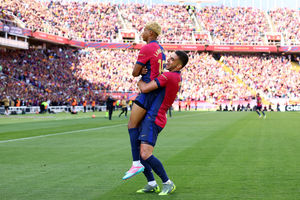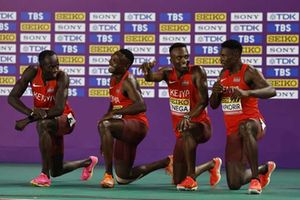
Athlete Johanna Kariankei displays his beadwork at his shop in Iten, Elgeyo Marakwet County on April 12, 2025.
A professional athlete’s training can be an expensive affair, especially in a place like Iten, Elgeyo Marakwet County.
The area, a popular training base for long distance runners, attracts hundreds of athletes, both local and foreign.
For aspiring runners, particularly those who don’t hail from the region and have yet to secure a spot in a training camp, training is particularly expensive.
These athletes must find creative ways to fund their stay in this bustling township, often resorting to manual labour to scrape together enough cash to pay for lodging and other expenses.
When Johanna Kariankei, left his home village in Narok in 2010 to chase his childhood dream of becoming a professional athlete, he had a fall-back plan of sustaining himself while training in Iten.
Growing up, Kariankei had mastered the art of beadwork, a skill deeply rooted in his culture. He began crafting bracelets with the colours of the Kenyan flag and selling them as souvenirs to foreign athletes training in Iten.
“You need to pay rent, buy food and invest in training gear, especially running shoes. To afford all these, you need an income before getting established and winning in big races. That’s why I decided to use my beadwork skills to earn something small,” Kariankei, the 2015 Toronto Goodlife Half Marathon champion, says.
In the early days, Kariankei worked alone. “I would make the bracelets right after training sessions and sell them in the evening from a small stall,” he recalls, gesturing to an open spot in front of his current shop.
Today, the 33-year-old athlete has two assistants, allowing him to train more freely and even travel for competitions abroad without worrying about his business.
“I trained them on everything, from designing, making the bracelet and even customer relations, now they handle nearly everything, just consulting me on matters they think need my attention,” added Kariankei.
His shop, a timber-walled structure at the Kamariny Stadium junction, sits just 100 meters from the iconic “Welcome to the Home of Champions” – signage that symbolises Iten’s status as a high-altitude training haven.
The shop’s exterior, once a bright white, has faded slightly over time. On one side, a Kenyan flag is painted boldly, with the shop’s name, “Olympic Corner,” inscribed above it.
On another wall, a striking mural of an athlete in a Team Kenya jersey stands out, accompanied by the inspiring words of marathon legend Eliud Kipchoge, “No Human is Limited”.
During our visit, Kariankei’s sales prowess was on full display. As we settled in for the interview, a group of American tourists walked in. Within minutes, he had closed a sale of several bracelets and artefacts worth Sh1,500. Each standard Kenyan bracelet sells for Sh300, though prices can rise slightly for customised designs, such as those featuring a client’s name.
“Most of my clients are European athletes who come to train here,” Kariankei explained, pointing to a dozen flags adorning the shop’s walls. “But lately, I’ve been getting more customers from the US.”
He adds, “When clients see their country’s flag on the wall, they feel a connection and often end up buying more.”
Making a standard bracelet takes about two hours, depending on experience. He says the business idea came about after he realised that the ultimate goal of most athletes is to represent their country in the Olympics, and that most of them would like to have a memory of their journey to qualifying for the Games.
“When I came to Iten I realised there were a lot of foreign athletes, especially in an Olympics or World Championships year. I discovered Kenya is important to them in their journey towards realising their Olympics dream. So, I decided to make something for them to remember their training time in Kenya,” he said. Hence the name of his shop “Olympics Corner Iten”.
Kariankei’s business has also led to unforgettable encounters.
“See that UK flag?” he said, pointing to a Great Britain flag next to a US flag. “The Great Britain team gave it to me when they trained here before the 2012 London Olympics. I even met Mo Farah and sold him a bracelet.”
His pride was palpable.
The popularity of Kenyan bracelets has soared globally, with several celebrities and athletes wearing them.
During the 2024 Paris Olympic Games, the bracelets became a sensation, worn by athletes and fans from various nations. Tennis star Serena Williams’ seven-year-old daughter, Alexis Olympia Ohanian, was spotted wearing one, as were a Polish athlete and a Jamaican sprinter.
Kariankei believes the allure of Kenyan athletes draws foreigners to Iten, and the bracelets serve as a symbol of connection. “They’re like an identity,” he said. “When someone wears one, it shows they’ve either been to Kenya, are Kenyan, or have a close tie to the country.”
To cater for his international clients, Kariankei has innovated by blending the Kenyan flag with the flags of his customers’ home countries. “It makes them proud of their nation and Kenya,” he explained.
He personally wears a Kenyan-Canadian bracelet, a nod to his first international race victory in Canada in 2013. “I’ve made so many Canadian friends since then,” he said with a grin.
Just like most businesses, Kariankei says, he too took a heavy hit during the Covid-19 pandemic that caused huge disruptions around the world, especially with the restrictions of movement by many countries as a measure countries to contain the virus.
With no foreign athletes coming to train in Iten he says he was forced to close his shop for almost two years.
“Before Covid I had seven workers. In fact, I had opened a workshop back at home in Narok where I had five employees to design and do the beadwork, the other two workers were stationed here at the shop and their job was just to sale,” he said.
The pandemic also affected his running career. “It became very hard to get invites to compete abroad. As a result, I stopped regularly working out. When I resumed after things opened up I struggled because I kept getting injuries.”
He said that the business is recovering and he has since reinstated two of his employees.
“For the last three years when I have been struggling with injuries, the earnings from the business has been helping me to sustain myself,” he said, adding that his running career and the business was helping him earn his living.
While Kariankei doesn’t stay in a training camp now, he trains alongside other athletes and gives back to the community whenever he can.
Together with well-wishers, he helped construct wash rooms at the Boston start point, where athletes gather for fartlek training sessions.
Looking ahead, Kariankei dreams of opening a larger souvenir shop in Iten.
He is currently training for the Vancouver Marathon set for May 4. But before that he will compete at the Vancouver Sun 10km on April 27.
His personal best in 10km is 30 minutes 34 seconds, Half marathon 1:06:51 and marathon 2:30:20.









